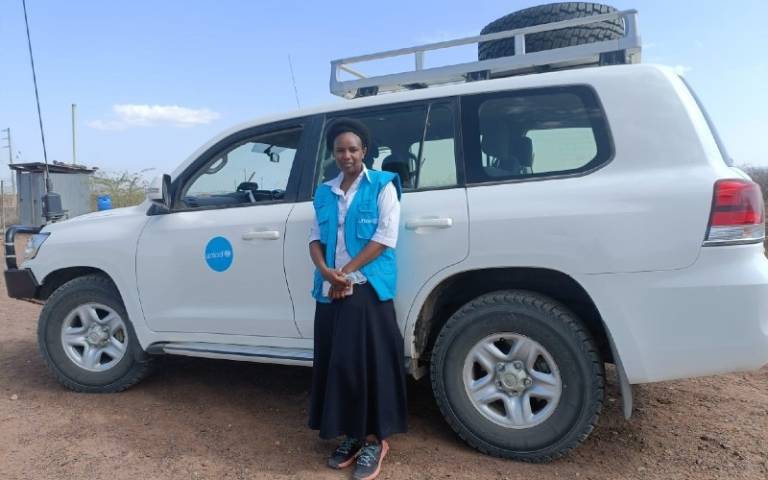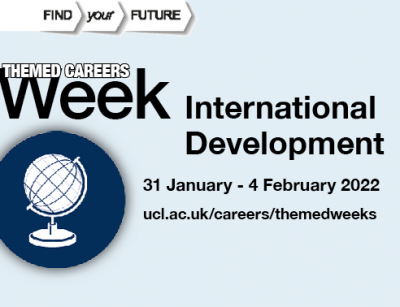Reaching the world's most disadvantaged children at UNICEF: Agnes Ngonyo
UCL Alum, Agnes Ngonyo, shares her career journey beyond graduation and gives an insight into her current role with UNICEF, Kenya.

1 February 2022
What is your current role and responsibilities?
In this role, I provide technical expertise in the planning, designing, implementation and evaluation of early childhood development and education programs in Kenya.
My overall role is to provide effective program management of ECD and pre-primary education including advocacy to influence the government and stakeholders to prioritize investment in the early years.
I take lead and oversee KCO partnerships with the Government of Kenya and Civil Society Organizations (CSOs) on ECD and pre-primary education.
I act as the Secretary to ECD Taskforce and support ECD Convergence. In addition to these growing responsibilities, I have contributed to the improvement of Early Childhood Education in Refugee Settings, In Kakuma Refugee Camp an area that is complex with minimal support from the government.
Describe your typical working day
In a typical day, I arrive at the office around 8:30 am after dropping my daughter to school.
As is our tradition in the office, I say hello to colleagues, then review my to do list and respond to any urgent emails from my supervisor, senior management team, headquarters or colleagues.
I am responsible for managing several grants and I have to fundraise through proposals and ensure implementation of the grants by designing programs with government and partners based on UNICEF grant agreements and donors.
I spend a considerable amount of time on phone or online meetings to design programmes and provide technical support based on UNICEF cooperation agreement procedures.
Once I receive partnership documents, I take lead in having them approved through our internal process after which I closely collaborate with partners, to support implementation and monitoring. Therefore, I often travel to the field to monitor projects and programmes.
Due to COVID, UN offices were closed for the better part of 2020 and 2021, and I worked from home, and due to the excellent UNICEF business continuity plan, it has been a seamless transition. Our mission in UNICEF is to leave no child behind especially the most marginalized and vulnerable in society.
How did you end up in your current role?
Prior to this role, I worked briefly at RTI International, (Jan to October 2015) under the Tayari Early Childhood Education Programme, Nairobi, as a Senior Education Specialist.
My main role was to provide effective leadership in strengthening early childhood education programmes in Kenya. Previously, I worked at Aga Khan Foundation (AKF) as an Education Specialist, team leader and coordinator of partnerships for Education for Marginalized Children in Kenya (EMACK) project.
EMACK was a United States Agency of International Development (USAID) supported programM with the overall goal of enhancing equitable access and increasing learning outcomes for grades I, 2 and 3 in North Eastern, Coast and Nairobi regions Kenya.
The application process for the current position included submitting my application letter, CV and personal history P11 form through UNICEF career website. I was then invited to take a written test and then a face-to-face competency-based interview.
My MA, Educational Planning, Economics and International Development at UCL immensely positioned me well to succeed in this role.
Agnes' advice to students who want to work in this sector:
International development is very dynamic, there are new emerging issues that evolve every day and require attention. Working in the sector requires a lot of flexibility, respect for diversity and lots of proactiveness. There are many opportunities in the sector, and one should be open to not only work in the home country but be open to work in countries especially experiencing emergency. I haven’t ventured much in terms of other countries but recently I had a stretch assignment with UNICEF Namibia office that opened my eyes to the common development challenges experienced across the board.“International development is very dynamic, there are new emerging issues that evolve every day and require attention. Working in the sector requires a lot of flexibility, respect for diversity and lots of proactiveness. There are many opportunities in the sector, and one should be open to not only work in the home country but be open to work in countries especially experiencing emergency. I haven’t ventured much in terms of other countries but recently I had a stretch assignment with UNICEF Namibia office that opened my eyes to the common development challenges experienced across the board.International development is very dynamic, there are new emerging issues that evolve every day and require attention. Working in the sector requires a lot of flexibility, respect for diversity and lots of proactiveness. There are many opportunities in the sector, and one should be open to not only work in the home country but be open to work in countries especially experiencing emergency. I haven’t ventured much in terms of other countries but recently I had a stretch assignment with UNICEF Namibia office that opened my eyes to the common development challenges experienced across the board.International development is very dynamic, there are new emerging issues that evolve every day and require attention. Working in the sector requires a lot of flexibility, respect for diversity and lots of proactiveness. There are many opportunities in the sector, and one should be open to not only work in the home country but be open to work in countries especially experiencing emergency. I haven’t ventured much in terms of other countries but recently I had a stretch assignment with UNICEF Namibia office that opened my eyes to the common development challenges experienced across the board.
What is the best thing about the sector?
I enjoy doing my work because of the opportunity it gives me to work for the most vulnerable at the same time influence government, development partners, donors and communities to prioritise early childhood development and education and ensure no child is left behind.
My job entails working collaboratively with others, building and maintaining partnerships, strategic thinking, drive to achieve results for impact and hence keep me energized and motivated to deliver results for children.
Nevertheless, my job can be very overwhelming especially because there are so many competing tasks and the context is unpredictable due to emerging emergencies.
Every other day, there are tight deadlines to be met. Working with the government to influence policy and strengthen the system requires a lot of patience and strategies that are effective. Ensuring a work-life balance helps me to ensure a healthy life.
 Close
Close


